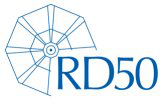Speaker
Description
The CMS detector will be upgraded to face a 10-fold increase in integrated luminosity for the High-Luminosity LHC era. Its endcap calorimeters will be replaced by the high-granularity calorimeter (HGCAL). With its unprecedented transverse and longitudinal readout/trigger segmentation, with more than 6M readout channels, HGCAL will facilitate the use of particle-flow calorimetry. Silicon pad sensors will be used for high radiation regions, covering a total area of 620 m2, where it is expected to reach integrated neutron fluences of 110^16 neq/cm^2 and doses of 1.5 MGy. The silicon sensors are processed on 8-inch wafers with three different thicknesses (300, 200, 120 μm), cut into hexagonal shape for tiling and for optimal use of the wafer area. Each sensor is segmented into several hundred cells of hexagonal shape of 0.5 to 1.1 cm2 in size, each of which is read out individually. In addition to the main sensors, the full wafer hosts small sized test structures used for quality assurance and radiation-hardness tests. We present the results of an ongoing radiation-tolerance testing program of the bulk material of HGCAL prototype silicon sensors that has been carried out with test structure diodes irradiated up to 10^16 neq/cm^2 in the JSI Ljubljana reactor. This talk will focus on the annealing behaviour of the bulk material. Results on the electrical characterisation in terms of capacitance and leakage current measurements will be presented as well as measurements of the charge collection efficiency using infrared TCT as a function of annealing time.




